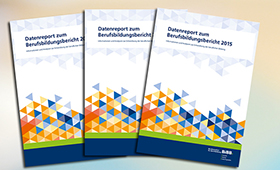Training Mismatch Today – Skilled Labour Shortages Tomorrow
The BIBB Data Report on the 2015 Vocational Education and Training Report has been published
15/2015 | Bonn, 15.04.2015

The small and smallest companies – particularly in the skilled trades – have for some time been faced with the problem of being unable to fill the apprenticeship positions they offer. It is now apparent that medium-sized and large companies are encountering early problems matching supply and demand, if not yet to such a serious extent. Despite this, only very few companies have reacted to the development with altered recruiting strategies. Above all, a more targeted appeal to those possibly interested in an apprenticeship and special applicant groups is necessary so that their potential can be developed more successfully. It is absolutely necessary that the dual system of vocational education and training be opened up to applicant groups who have had significantly fewer chances in the training market, for example because of their origins or education background, so that the emerging skilled labour shortage can be reduced.
These are the key results of the new “Data Report” from the German Federal Institute for Vocational Education and Training (BIBB), which was also published today along with the Federal Government's 2015 Vocational Education and Training Report. With the core topic “Training Mismatch Today – Skilled Labour Shortages Tomorrow and Thereafter”, the 2015 BIBB Data Report addresses a key question in educational policy.
People capable of gainful employment are not the only group that will shrink in Germany thanks to demographic developments. The ongoing expansion of education means that an increasing number of people will have an academic qualification in future. While only 30% of school graduates left schools of general education or vocational schools with a university entrance qualification in 1992, the number of people with a university entrance qualification in the same age group in 2013 had risen to 60%. According to BIBB researchers, this will cause a shift in the qualification and professional structure of the population capable of gainful employment in a lasting way.
This development has already become noticeable in previous years in the increasing problems matching supply and demand on the training market; problems which will continue in the labour market. For example, despite a decline in applicant numbers in the last year, around 37,000 appren-ticeship positions remained unfilled, which is a new high.
It would be appropriate, here, to develop the potential of young people without a certificate of secondary education more successfully, because of the approximately 14.8 million young adults aged between 20 and 34, approximately 470,000 had no certificate of secondary education in 2011 (more current data is not available). Approximately 87% of these did not acquire any vocational qualification either. Only approximately 60,000 achieved a vocational qualification or were still in training. Of those who had achieved neither a certificate of secondary education nor a vocational qualification, just under 47% were in gainful employment.
According to the BIBB's analysis, there is no discernible change in the trend regarding demographic developments. On the contrary: In the next decade, the baby boom generation will leave the labour market and it will not be possible to replace them with the younger generation, in their numbers or qualification profiles, which will lead to another increase in the looming shortage of skilled labour.
With its indicator-based data report, the BIBB provides comprehensive information and the results of scientific analyses in addition to the annually-published vocational education and training report. The 2015 BIBB Data Report is made up of over 500 pages and approximately 300 tables and diagrams with current data on vocational training and continuing education in Germany.
The draft version of the BIBB Data Report which refers to the 2015 Vocational Education and Training Report can be downloaded in PDF format free of charge at www.bibb.de/datenreport2015 The print version is expected to be available at the end of June.
The Federal Government's 2015 Vocational Education and Training Report can be found online at www.bmbf.de/de/berufsbildungsbericht.php
The qualification and occupational field projections compiled jointly by the BIBB and the Institute for Employment Research (IAB) also provide further information on expected labour market devel-opments in the individual regions of Germany up until the year 2030, to be found at www.qube-projekt.de
If reprinted, please send specimen copy.